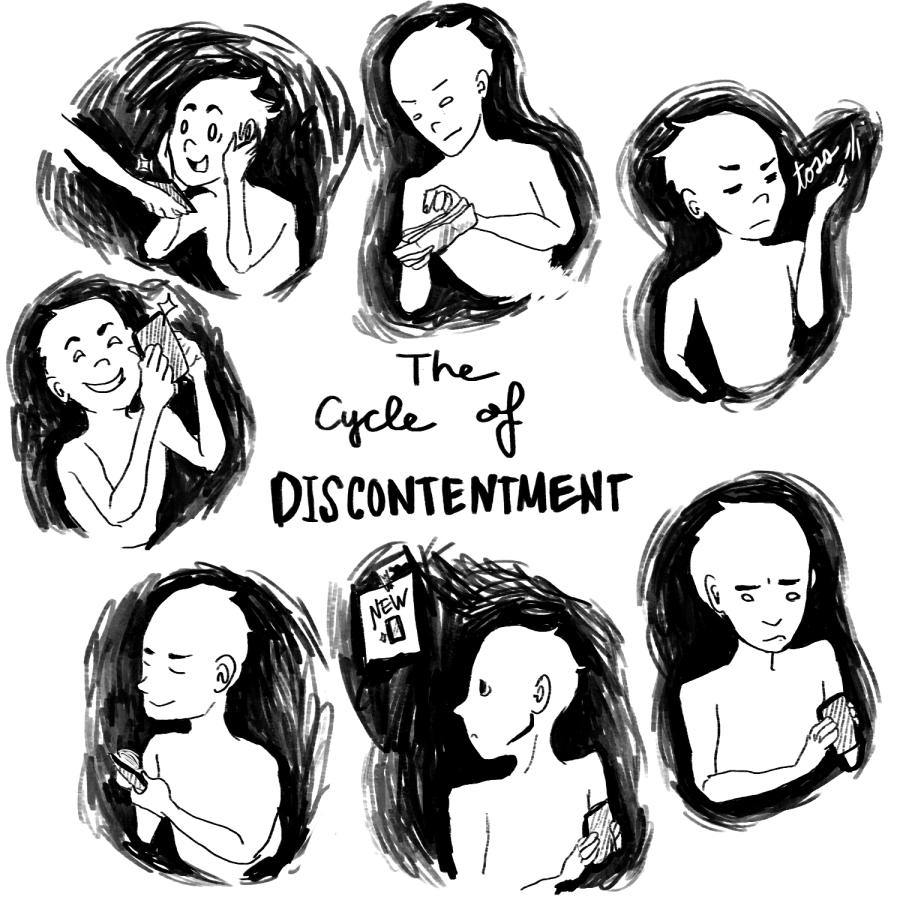The Cycle of Discontentment
How technology construes our social ideals and mentality
With technology becoming more and more intertwined with everyday life, many people believe that technology can become an obsession and cause problems with people’s psyche, according to EWU associate professor of psychology Kurt Stellwagen.
According to Division 46 of the American Psychological Association, 90 percent of communication is screen-based and 77 percent of people use multiple devices simultaneously.
EWU senior James McKee said his 22-year-old son purchased a new iPhone 6 with his credit card for the sole purpose of playing a game.
McKee said he feels his son is obsessed with playing games on his iPhone.
“I think it’s obsessive. I think he is so caught up in the fact of bigger, better, faster than actually being able to [think] ‘Do I need this?’ If you have to put it on a credit card, you can’t afford it. … [Technology] has always been there, it will always be there,” said McKee.
Author Larry Rosen wrote a book about dependency on technology titled, “iDisorder: Understanding Our Obsession with Technology and Overcoming Its Hold on Us,” in which he describes the effect that technology can have on its users.
“The argument that I will make is that over-reliance on gadgets and websites has created an enmeshed relationship with technology and that this relationship can cause significant problems in our psyche, what I call an iDisorder,” Rosen said in his book. “I will also argue that we are being compelled to use technologies that are so user friendly that the very use fosters our obsessions, dependence and stress reactions.”
As one walks around the Eastern campus it is obvious the feelings for technology. Students sitting in the campus mall talking with friends can not resist the urge to check their phone. Some students text while visiting with peers and engage in numerous conversations at one time.
Stellwagen said he thinks that technology can have negative impacts on its users’ psyche. He said there are some risks that come with having technology.
“I think the risk would be that we have a generation of people who can’t slow down enough to have deep conversations, read books or watch a slow movie. They almost show ADD behavior. I think that is the risk,” said Stellwagen.
Stellwagen said this obsession to have the newest and coolest is not exactly forming with technology.
“I do feel like it’s human nature to want the bright, shiny new thing. Americans used to trade in their car once a year when that was economically viable and cars didn’t last as long,” said Stellwagen. “I do think we have this desire to always have the bigger and the best thing, and I think part of it is it makes us feel complete.”
Stellwagen said he knows a few people who try to elevate their happiness through their purchases. He said buying something new does peak one’s happiness, but it is only for a moment.
“I think it’s related to the ‘shop till you drop’ phenomenon. I think we live in a materialistic culture and we are trying to buy happiness,” said Stellwagen. “The problem is because it doesn’t work that doesn’t make us stop, it makes us try harder. That is kind of like the irony of the human condition.”
Stellwagen said it is important to maintain happiness without buying new gadgets. He said one of his friends tried to justify buying a new phone but instead just confirmed to Stellwagen that the purchase was based solely off of the desire to have more.
After his son bought the iPhone 6, McKee said things have gone too far. He believes that technology, although useful, should not be so much a part of the lives of their users. He said people are putting too much information into their gadgets, and way too much time.
“I think it has gone overboard. I think the gadgets are taking over our world, and people aren’t even realizing it,” said McKee.
Stellwagen said he believes that technology is a great resource but that it needs to have limits. If people become too attached to their technology and games, it could lead to superficial processing.
“What I mean is that when people multitask, which people do more of now that they have smart phones and because multitasking is now the norm, they don’t fully attend to any one thing they are doing,” said Stellwagen. “So when they are trying to read their textbook while the is radio on and while receiving texts they are only absorbing (processing) the material using 1/2 of their attention (superficially).”
“I probably do think the pros outway the cons,” said Stellwagen. “I think technology has brought us so much, just from an educational standpoint. I do think the benefits outweigh the negatives, and there is all this wonderful technology for people who have handicaps. But again I do think the risk is we can’t turn education into a sound byte.”
Stellwagen said technology users should try to minimize the risks involved in becoming too attached to their gadgets. Otherwise, he fears no one will be attracted to anything that does not involve a screen.
McKee, who just recently upgraded his phone, said that was enough for him.
“I probably won’t update anymore. I won’t do an iPhone, and I don’t need a bigger phone,” said McKee.
In a summary of the problems and the solution that Rosen provides in his book he said, “We can’t do seemingly simple activities without first consulting the Internet. We can’t tear ourselves away from the highly addictive, highly compelling world of cyberspace. I am not proposing that you give up all technology and media. … But it’s not too late to recognize the craziness that technology can promote and discover new ways to stay sane in a world that encourages – and even promotes – insanity.”














